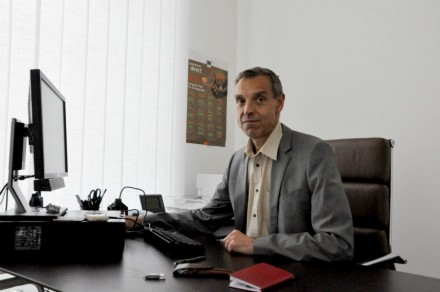
“For me as a part of the community here for four years, I think, it is very important for Georgia to do more in the field of environment, because I see that the situation in Tbilisi is very bad in terms of air pollution” (DF Watch)
“I think that Georgia is almost there when it comes to fulfilling the visa liberalization action plan. Now it is up to the member states of the EU to decide. I think that people in Georgia deserve visa-free regime. I see no reason now to delay it further,” says Boris Iarochevitch, Deputy Head of Delegation of the European Union since 2011, said.
He is leaving Georgia soon to start his new assignment in Brussels. “I will continue to defend Georgian interests in Brussels,” he says.
DF Watch visited Mr Iarochevitch in his office and talked about the developments he is leaving behind and his views about current events in Georgia, its future perspectives and, of course, some geopolitics.
Since 2011, Georgia went through a whole number of changes, including the parliamentary elections of October, 2012, when the United National Movement government was peacefully replaced by the Georgian Dream coalition. There was also the presidential elections in October, 2013, and the local elections in 2014.
“I’ve seen of course a lot of tensions during these elections, but still overall the process has been rather peaceful and democratic. I’ve seen a lot of progress also in the field of independence of justice,” he told DFWatch.
“I think the justice system is more independent now than it used to be four years ago, when I arrived. I also see a more diverse political life. In the past, you had almost only one party, very strong power vertical in Georgia, now it is more balanced. It means also more discussions, more disputes, that’s good and I think the parliament is more diverse now. You have the ruling coalition, also the UNM, you have the Free Democrats. I think it is a more balanced democracy in terms of discussions.”
The current government’s major challenge is the economy, specifically a non-sustainable economic model; foreign trade figures are not promising, as there has always been a huge gap between export and import, Boris Iarochevitch said.
“Of course, you have income from tourism, you have remittances, foreign investments, but still the model is not sustainable. Maybe it worked for some years, but you cannot build the economy on that with such a trade gap and without anything else to compensate, so I think Georgia has to try and export more, to find export niches, and it’s not easy.”
In his opinion, the economic model needs adjustments and Georgia has to think of other options, revise quality standards, safety standards and could develop a more service-based economy, which could be used by neighboring countries in the Caucasus.
As for the drastic drop in the value of the national currency, Iarochevitch calls it “a normal process.”
“Georgia needs dollars, because it exports are not enough and it doesn’t get enough dollars from abroad. It is a very dollarized economy. I think what is happening now is a natural process and you see this is happening in the whole region. Kazakhstan’s tenge has devaluated roughly, a few days ago,” he says.
“I would say the main challenge now is the economy. The government has done a lot socially, I mean increasing pensions, increasing the insurance, medical insurance coverage, but you need to sustain that with more revenues, more income. That was a challenge in the past, it remains a challenge for Georgia today.”
When asked what he thinks about voices of criticism against the current government about alleged selective justice against top figures in the Saakashvili government, Iarochevitch responded that ‘not everything was perfect’ in the past.
“We should avoid harassment of opposition, because it is counterproductive and diverts efforts needed to face real challenges, which are economic,” he said.
“I understand there are lot of cases inherited from the past, abuses, but they should all be treated equally and not focused on some top officials. To me the weak point here is the legal system – the pre-trial detention – which is systematically used and abused. Of course there are cases where pre-trial detention is required to conclude a case, investigation, but I think [there is] excessive [use of such detention]. We are also pushing for reform to smoothen that and also to keep the spirit of not adding several pre-detention periods, and this has happened for some of the politicians,” Iarochevitch said, indicating, but not mentioning directly, the case of Gigi Ugulava, former Tbilisi Mayor and one of Saakashvili’s closest allies.
The deputy head of the EU delegation said that there is planned a visit here by EU experts in late September, which would assess all the benchmarks of Georgia’s progress in its visa liberalization efforts with the EU, and present a report to the member states in December. Georgians believe that based on this report the EU will grant its citizens visa free travel to the Schengen Area.
DFWatch: How would you assess Georgia’s progress on the way to visa liberalization?
Boris Iarochevitch: Efforts have been enormous. I can testify that Georgia and Georgian authorities have been working 24 hours a day to complete all the benchmarks. We are almost there. There were about 15 benchmarks and more than half have been completely met, and the rest almost or partially.
We have to see, but I think that Georgia is almost there when it comes to fulfilling the visa liberalization action plan. Now it is up to the member states of the EU to decide. I think that people in Georgia deserve a visa-free regime. I see no reason now to delay it further.
DFWatch: Many Georgians, and some government officials, are quite optimistic that visa liberalization may come into force at the end of this year or early next year. The Foreign Ministry published a video tutorial of how to use the opportunity of visa-free regime. How realistic is that?
Boris Iarochevitch: First of all, I think it is very good to warn people in advance. I think this information campaign is extremely useful, because as you know visa free doesn’t mean that you can study or work in the EU. It is for short visits and still even with the free regime you can be checked up at the border and asked at the EU border whether you have a flying ticket back, if you have enough means and so on. Thus, I think it is very important to inform the citizens in advance.
For this year I think it will be technically difficult. That would be rather early next year and then of course there are months of preparations. So I think it will be most probably next year. I cannot give a date, but it would be the first half, I would say. As you know, EU is a very big institution. We have the Commission, which does the technical assessment and then you have member states, the European Council, which has to take the final decision. Also the migration is a very big topic now.
DFWatch: I would like to ask you about that. Hungary is building a wall along the border with Serbia. Some others challenge EU decisions about quotas. How would the EU handle this problem? Will it make any drastic changes in its policies and will it affect Georgia’s visa liberalization expectations?
Boris Iarochevitch: It’s a big challenge for the EU. Of course we have a dramatic situation in several parts of the world. Now we have hundreds of thousands of people trying to go into the EU and it’s a big challenge, because we have a number of countries which are very exposed, in the southern part of Europe. We are taking measures trying to accept as many people as possible.
It shouldn’t have an impact on Georgia, because Georgia is a very small country. There are already Georgians in the EU. We have some concerns with criminality, but very often these people are already European citizens. They are called Georgians because of the origin. Rather than immigration or illegal migration from Georgia to the EU, and of course the economic situation here is not very helpful, as you have half of the population jobless, there will be a tendency for looking for jobs in Europe, but rather than that concerns of some member states would be organized crime, but I think it is overall marginal.
More positive is that Georgians are not involved in blood crimes in the EU. It is more robbery. Of course people don’t like it but at least it is not violent crimes. Despite all these migration pressure I don’t think that Georgia represents major risk for the EU. So I hope it will not be an obstacle for visa free and it should not be used by politicians in Europe to delay visa free regime for Georgia.
DFWatch: What does Georgia need to do to raise interest toward itself in Europe, to raise awareness?
Boris Iarochevitch: When I go to Belgium and I say I am living in Tbilisi, nobody knows it, the average citizen doesn’t know Georgia. Of course, people who like to travel know more, but ordinary people usually have no clue about Georgia and Tbilisi and it is absolutely marginal in their lives. I think that the fact that we signed the Association Agreement is already something. I think we need good news from Georgia and one way is to promote Georgian products, for instance wine, water, which aren’t well known in Western Europe, at least not yet. It is known in the Baltic States, but I think Georgia could do more. I also think that food is also a very good way to be known. If you start selling Georgian wine, water in shops I think people would start to get interested. I like Georgian beer. Even in Belgium, where we have hundreds of different kinds of beer, I think people are interested in discovering new things.
DFWatch: How should Georgia handle its problems with Russia? The political spectrum here is divided on this issue. Some politicians and experts demand a tougher approach and criticize the government for its conciliatory stance toward Russia, while others think that tough statements will bring more harm than benefits.
Boris Iarochevitch: It is up to the government. I think Georgia has a very big neighbor and you don’t choose your neighbor. Georgia is still very exposed, because it is not member of any of military alliance, not member of the EU, so I understand that Georgia has to be very careful. We as the EU have always supported that Georgia has to establish contact with Russia, to have a dialogue.
Even in EU we have major disagreements and major concerns about what is happening in Ukraine, but still we try to keep channels open, we have not banned trade with Russia, we have put sanctions very targeted against financial institutions, state companies, but otherwise we still encourage people to people contacts with Russia and we keep a dialogue with the authorities.
We have a number of common challenges; what’s happening in Iraq, in Syria, also climate change, we continue space cooperation with Russia. So I think Georgia so far is right in this approach, which is maybe imposed by the circumstances, but I would say Georgia has not many choices, we have to take geopolitics into account and still for Georgia the Russian market could be important, despite the economic crisis in Russia.
We always say that DCFTA with the EU doesn’t mean that you forget about the traditional trade partners, Turkey is a big partner, Russia, Iran tomorrow. I think the government tries its best to keep the balance and we support the government in this prospect.
DFWatch: Georgia has not joined the EU sanctions against Russia, except the one regarding goods produced in Crimea. How did Europe’s political circles see this decision?
Boris Iarochevitch: Georgia is a sovereign country and free to join sanctions or not. We have never demanded from Georgia to join the sanctions, because we understand the situation. We don’t want our Association Agreement with Georgia to be exclusive. We want to keep it open. Georgia has joined some sanctions about illegal annexation of Crimea and that’s it.
I think it is a courageous gesture and we don’t ask for more. We also understand that the economic situation is difficult in the country. Georgia needs all markets, it needs investments and needs to keep economic relations with its neighbors. So we are not demanding more sanctions. We welcome Georgia joining part of the sanctions.
DFWatch: What are Georgia’s most immediate short-term and middle-term goals in terms of its European integration?
Boris Iarochevitch: We have an AA with very clear work program for the next eight years. The clock started ticking on the first of September and the first deadline will be next year. Georgia is working on it. We are now starting to monitor the approximation process, but the first real deadline will be in a couple of years. Georgia is on track.
For me as a part of the community here for four years, I think it is very important for Georgia to do more in the field of environment, because I see that the situation in Tbilisi is very bad in terms of air pollution. Of course it may seem marginal for many people, but we are talking about the health of Georgians, health of children, health of the future generation. Environment is an area where Georgia could do more and could do a lot in the coming years in terms of fuel quality, technical inspection of cars.”
Mr Iarochevitch will continue working in Brussels for the External Action Service, the diplomatic service of the European Union, and will also work with Eastern Partnership countries.
“I look forward to Georgia getting a visa free regime but beyond that we find more Georgian products on the European market and I will continue to defend Georgian interests in Brussels,” Boris Iarochevitch said.
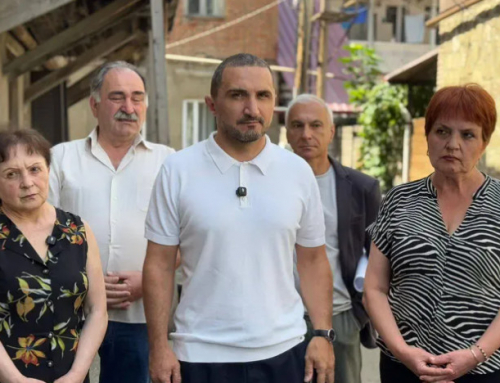
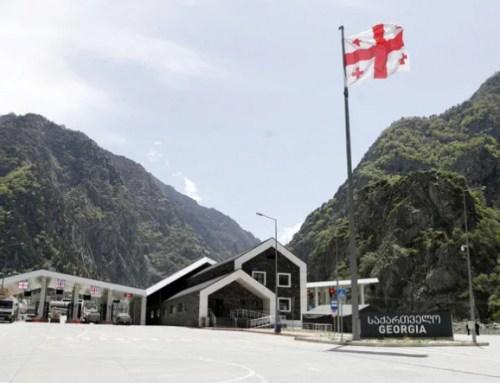
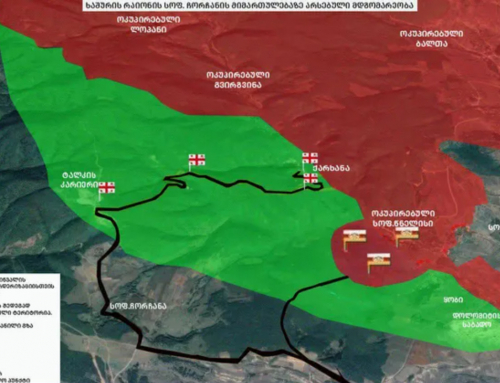
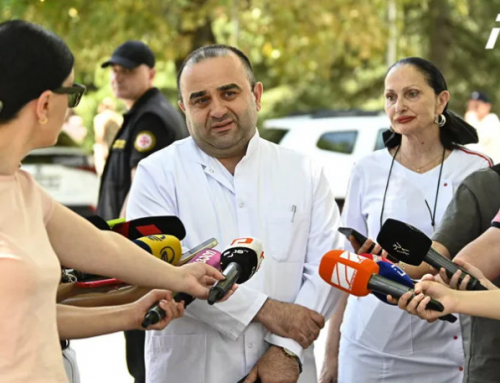
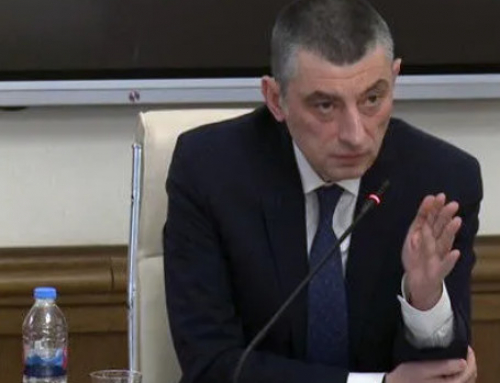
Leave A Comment
You must be logged in to post a comment.